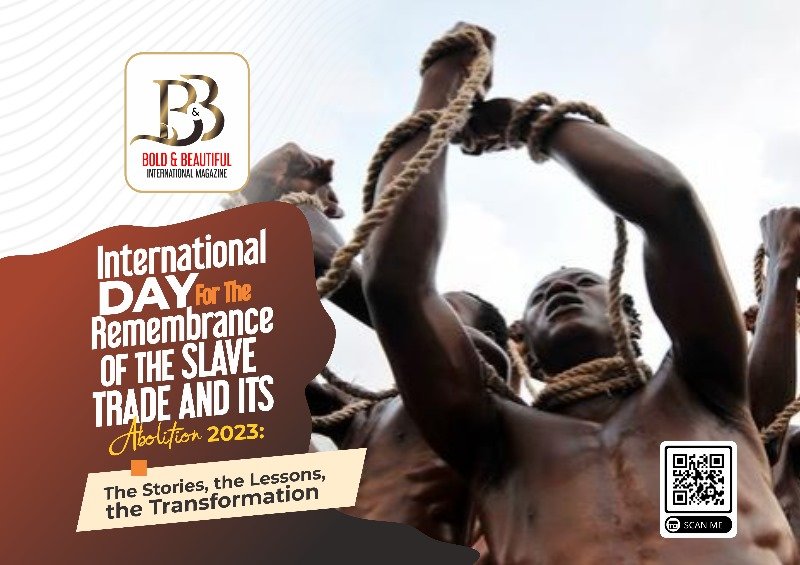
The stories of those who endured the horrors of the transatlantic slave trade, and of those who fought tirelessly for its abolition can still be heard in the quiet corridors of history, buried beneath the weight of generations. These stories of courage and indomitable spirit are impossible to forget. Today, as we commemorate the International Day for the Remembrance of the Slave Trade and its Abolition in 2023, we unearth these stories and explore the theme that serves as our guiding light: “Fighting Slavery’s Legacy of Racism through Transformative Education.”
A Legacy That Haunts: The Transatlantic Slave Trade
To understand the significance of this day, we must confront the chilling reality of the transatlantic slave trade, a dark chapter in human history. For over four centuries, millions of Africans were forcibly taken from their homes, shackled, and transported across the Atlantic Ocean to be sold into a life of abject servitude. The transatlantic slave trade was not just an economic enterprise; it was a system that dehumanized, exploited, and left an indelible scar on the souls of both those enslaved and those who enslaved them.
The legacy of this brutality continues to reverberate through the corridors of time, casting a long shadow over modern society. The chains may have physically crumbled, but their echoes persist in the forms of racism, discrimination, and systemic inequality that persist to this day. It is against this backdrop that the International Day for the Remembrance of the Slave Trade and its Abolition takes on profound importance.
The Power of Remembrance
This day is not merely a history lesson; it is a call to remember, to honor the millions who suffered, and to reflect on the enduring impact of slavery on our world. It is a call to confront the uncomfortable truths of our past and to recognize that healing and progress can only come through knowledge and understanding.
Transformative Education: The Key to Unlocking Change
The theme for 2023, “Fighting Slavery’s Legacy of Racism through Transformative Education,” emphasizes the vital role of education in dismantling the structures of racism and inequality that persist in our societies. It is a theme that carries immense weight and responsibility, for it acknowledges that education is the most potent weapon in the fight against prejudice and discrimination.
1. Unveiling the Truth:
Transformative education begins with a commitment to unveiling the truth about slavery and its impact. It is about acknowledging the horrors of the past, no matter how uncomfortable they may be. It is about teaching the unvarnished history of the slave trade in schools and universities, ensuring that future generations are equipped with the knowledge needed to understand the roots of racism.
2. Empathy and Understanding:
Education that transforms hearts and minds fosters empathy and understanding. It encourages individuals to put themselves in the shoes of those who suffered under slavery. This understanding is a powerful catalyst for change, as it helps break down stereotypes and prejudices.
3. Challenging Systems and Structures:
Transformative education is not passive; it is a call to action. It empowers individuals to challenge systems and structures that perpetuate racism and inequality. It inspires them to engage in meaningful dialogue, advocate for change, and dismantle the barriers that still exist.
4. Celebrating Achievements:
While we must remember the pain of the past, transformative education also celebrates the achievements of black and African people throughout history. It highlights their contributions to science, art, literature, politics, and countless other fields. It reminds us that the legacy of black excellence is as enduring as the legacy of slavery.
5. Fostering Solidarity:
Transformative education promotes global solidarity. It encourages people of all backgrounds to stand together in the fight against racism. It recognizes that the battle against slavery’s legacy is not the responsibility of one group alone; it is a collective endeavor that requires the participation of every individual, community, and nation.




